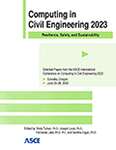Modeling the Decarbonization Potential of a Time-of-Use Building Energy Benchmarking Model at the Urban Scale
Publication: Computing in Civil Engineering 2023
ABSTRACT
Urban decarbonization targets and building performance standards are two ambitious policy packages that are rapidly being adopted by cities around the world. In order to evaluate relative energy efficiency in buildings many cities use a process known as building energy benchmarking. The output of energy benchmarking is useful for cities to determine what buildings are most inefficient in addition to providing data on estimated building-level greenhouse gas emissions. However, energy benchmarking often uses annual data to assess building performance and therefore may fail to capture insights on time-varying energy use and associated emissions. Without a more comprehensive view of energy usage and associated real-time emissions, current benchmarking methods and building performance standards are unlikely to accurately evaluate the decarbonization potential of urban buildings. Although there has been a growing interest in time-granular benchmarking the applications are limited due to concerns surrounding the collection and processing of such data. We utilize annual hourly data from a proof-of-concept hourly benchmarking platform to demonstrate the feasibility of time-of-use energy benchmarking. This data allows us to evaluate the performance of various benchmarking methods and building performance standards across different levels of energy use data temporal granularity. This analysis examines data at two scales: (1) inclusive of the buildings enrolled in the proof-of-concept and (2) extrapolated to all commercial buildings in New York City. The results are expected to demonstrate the value of shifting policy toward time-of-use benchmarking and its potential to help accelerate decarbonization of the urban built environment.
Get full access to this article
View all available purchase options and get full access to this chapter.
REFERENCES
Arjunan, P., K. Poolla, and C. Miller. 2020. “EnergyStar++: Towards more accurate and explanatory building energy benchmarking.” Appl. Energy, 276: 115413. https://doi.org/10.1016/j.apenergy.2020.115413.
Kiliccote, S., M. A. Piette, J. Mathieu, and K. Parrish. 2010. Findings from seven years of field performance data for automated demand response in commercial buildings. Lawrence Berkeley National Lab.(LBNL), Berkeley, CA (United States).
Krietemeyer, B., J. Dedrick, E. Sabaghian, and T. Rakha. 2021. “Managing the duck curve: Energy culture and participation in local energy management programs in the United States.” Energy Res. Soc. Sci., 79: 102055. https://doi.org/10.1016/j.erss.2021.102055.
Langevin, J., C. B. Harris, A. Satre-Meloy, H. Chandra-Putra, A. Speake, E. Present, R. Adhikari, E. J. H. Wilson, and A. Satchwell. 2021. “US building energy efficiency and flexibility as an electric grid resource.” Joule, 5 (8): 2102–2128. https://doi.org/10.1016/j.joule.2021.06.002.
Meng, T., D. Hsu, and A. Han. 2017. “Estimating energy savings from benchmarking policies in New York City.” Energy, 133: 415–423. https://doi.org/10.1016/j.energy.2017.05.148.
New York City Mayor’s Office. 2014. Overview of the Greener, Greater Buildings Plan.
New York City Mayor’s Office. 2019. “The Climate Mobilization Act, 2019.” https://www1.nyc.gov/site/sustainability/legislation/climate-mobilization-act-2019.page.
Perry, C., H. Bastian, and D. York. 2019. “Grid-interactive efficient building utility programs: State of the market.” Am. Counc. an Energy-Efficient Econ. Washington, DC,
Roth, J., and R. K. Jain. 2018. “Data-driven, multi-metric, and time-varying (DMT) building energy Benchmarking using smart meter data.” Lect. Notes Comput. Sci. (including Subser. Lect. Notes Artif. Intell. Lect. Notes Bioinformatics), I. F. C. Smith and B. Domer, eds., 568–593. Cham: Springer International Publishing.
Steen, M., and M. Krarti. 2020. “A Review and Categorization of Grid-Interactive Efficient Building Technologies for Building Performance Simulation.” ASME J. Eng. Sustain. Build. Cities, 1 (4). https://doi.org/10.1115/1.4048975.
The City of New York. 2009. Local Law 84.
The City of New York. 2016. Local Law 133.
The City of New York. 2018. Local Law 97.
The City of New York. 2018. “Requirements for Reporting Annual Greenhouse Gas (GHG) Emissions for Covered Buildings”. Rule 103–14.
Tozer, L. 2020. “Catalyzing political momentum for the effective implementation of decarbonization for urban buildings.” Energy Policy, 136: 111042. https://doi.org/10.1016/j.enpol.2019.111042.
Information & Authors
Information
Published In
History
Published online: Jan 25, 2024
ASCE Technical Topics:
- Air pollution
- Benchmark
- Buildings
- Business management
- Construction engineering
- Construction management
- Emissions
- Energy consumption
- Energy engineering
- Engineering fundamentals
- Environmental engineering
- Infrastructure
- Management methods
- Models (by type)
- Pollution
- Practice and Profession
- Scale models
- Standards and codes
- Structural engineering
- Structures (by type)
- Sustainable development
- Urban and regional development
- Urban areas
Authors
Metrics & Citations
Metrics
Citations
Download citation
If you have the appropriate software installed, you can download article citation data to the citation manager of your choice. Simply select your manager software from the list below and click Download.
